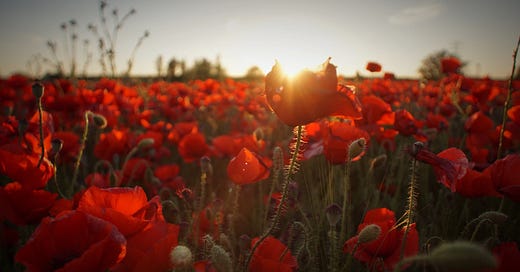Resistenza is a beautiful word
Why celebrating the anniversary of liberation of Italy from the nazis is so important now and how to safeguard our sense of what is right in overwhelming times

Tomorrow is the 25th of April and it’s a holiday in Italy.
We celebrate the anniversary of liberation from the nazis and the fascists.
As children, people of my generation, grew up hearing stories from the war.
Most of us had grandparents, aunts or uncles who’d experienced the war firsthand and those were stories that always came up over and over and aren’t easily forgettable.
The Second World War was never an abstract story for us.
You’d either hear stories of relatives running away from the bombs, the Nazis or the starvation that everyone endured.
Where I live in Cremona, at this time of the year people start putting out Italian flags and they keep them up until il primo maggio.
On the actual day of the 25th, there are ceremonies held all over the country commemorating the event.
As the people who witnessed the war, nazism and fascism, die out, I can’t help but wonder what younger generations actually know about that period.
I mean, when you’ve had relatives around the kitchen table tell stories from the war you have a familiar face attached to events that otherwise you’d only know about from books of history. It’s a different thing.
It’s one thing to read all this in schoolbooks or see it in a documentary. And another thing is to hear a loved one share his or her memories. To hear the horror.
I’ve been thinking over the last few days about the Italian word resistenza.
It’s such a powerful word. It means resistance.
The whole period in which partigiane (let’s not forget them) and partigiani gathered what little forces they had to fight back against fascism, is called resistenza.
What is resistenza in Italy in 2023? Is it still necessary?
It very much is. And perhaps, it’s so much harder to practice.
Our grandparents hid guns in the walls of their houses and took them out to fight the enemy.
The enemy wore a uniform.
Today’s enemy comes in other shapes.
It whispers soft lies and inaccurate information on social media. It claims that it is misunderstood but in the meantime, the words said out loud, linger on doing their damage.
The trouble with lies is this. If you keep repeating them over and over people get used to them. You normalize them. You allow them a seat at the table.
So, how do you fight your very own resistenza when you have people in power trying to minimize and put out false information about this delicate period of Italian history?
I don’t truly have an answer for that.
At the moment, Italy is being run by a right-wing government that has support from the extreme right.
During the last Digital Retreat I hosted, with Giulia from The Italian Timezone, we talked about how to handle disinformation around history.
What should we do when people try to rewrite history? How do you fight those lies being said until they become half-truths?
What Giulia said was to verify your sources, and check more than one source for your facts.
That’s undoubtedly important.
But also, I’ve been thinking that I’m going to be using my own personal moral compass.
If something would have been deemed outrageous/cruel/ false by my grandparents then maybe I have to reconsider it.
If Sandro Pertini ( one of the best presidents Italy ever had) would have been infuriated by something, then it’s not worth letting into our lives.
We don’t always move forwards.
We have this idea that we’re in constant evolution. In some areas that might be true but in others, sometimes the past has the best answers.
Because, with the excuse that times have changed and something is divisive, we risk tolerating things that aren’t remotely acceptable. Things that we should be resisting with all our hearts.
La Resistenza starts in our own minds when we decide to ignore the lies whispered insistently on social media.
When we access news from independent newspapers.
When we verify our information and check that it’s backed up by data.
When we think back to our grandparents and wonder, is this something they would have found acceptable?
We resist first of all in our minds.
We resist when we don’t allow our sense of what is right or wrong, to be polluted by others.
Resistenza è una parola bellissima. Because it honors our history.
Some people find Bella Ciao ( the anthem of Italian Resistance) divisive.
Well, yes, this song tells a story that divides us from nazis and fascists. That’s something we definitely should be divided from as long as we breathe.
Buona resistenza a tutte e tutti. E buon 25 Aprile.



Thank you for your words.